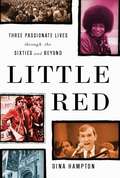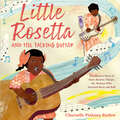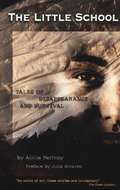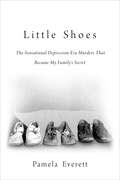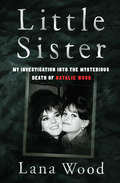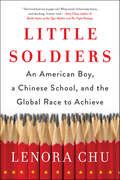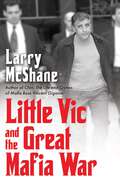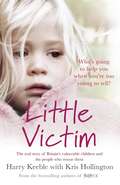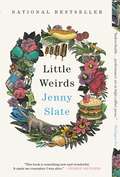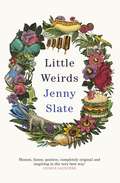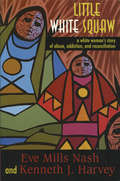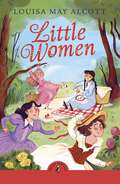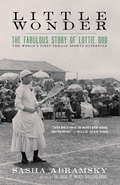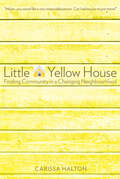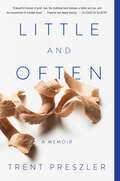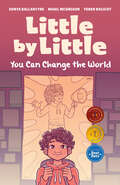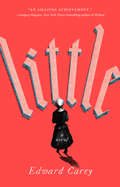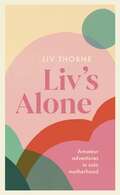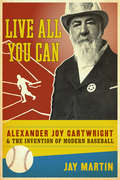- Table View
- List View
Little Red: Three Passionate Lives through the Sixties and Beyond
by Dina HamptonIn the early 1960s, a remarkable crop of students graduated from a small New York City school renowned for progressive pedagogy and left-wing politics: Little Red School House and Elisabeth Irwin High School. These young people entered college at the peak of the transformative era we now call The Sixties, and would go on to impact the course of United States history for the next half century. Among them were Angela Davis, the brilliant, stunning African American Communist and academic who became the face of the Black Power movement; Tom Hurwitz, Students for a Democratic Society (SDS) activist and cinematographer who played a key role in the occupation of Columbia University; and Elliott Abrams, who rebelled against the leftist political orthodoxies of the school and of the times, and ultimately played key roles in the Reagan administration, the George W. Bush administrations and the neoconservative movement.In Little Red, based on extensive original interviews and archival research, Dina Hampton tells the compelling, interwoven life stories of these three schoolmates. Their tumultuous, divergent, public and private paths wind through the seminal events and political conflicts of recent American history, from the civil rights movement to the Vietnam War; the Summer of Love to the feminist uprising; Iran-Contra to Occupy Wall Street. As they pursue political ends, each of their lives will be shaped by events, relationships and social changes they never imagined. Their successes and setbacks will resonate with anyone who has struggled to reconcile the utopian goals of The Sixties-or of youth itself-with the realities of day-to-day life in the world as it is. Today, a new generation is taking to the streets, galvanized by controversial wars and social and economic inequities as troubling as those we faced in the 1960s. The stories of Angela, Tom and Elliott serve as both road map and cautionary tale for anyone engaged in that most American of acts-trying to perfect the world.
Little Rosetta and the Talking Guitar: The Musical Story of Sister Rosetta Tharpe, the Woman Who Invented Rock and Roll
by Charnelle Pinkney BarlowA picture-book biography of Sister Rosetta Tharpe, the woman who invented rock and roll—a warm, inspiring tale of a childhood filled with music, community, and a drive to succeed."Music is the heart of our story," says Momma to young Rosetta, surprising her with her first guitar. Rosetta's strums sound like ker-plunks. But with practice and determination, she makes music, fingers hopping "like corn in a kettle," notes pouring over the church crowd "like summer rain washing the dust off a new day."In this stunning picture book, author and illustrator Charnelle Pinkney Barlow imagines the childhood of Sister Rosetta Tharpe, whose rural roots inspired the music we still hear today.Young readers will see a child's dream become reality through hard work and perseverance. And they'll learn the overlooked story of a pioneering Black artist, whose contribution to music history is only now being discovered.
Little School: Tales of Disappearance and Survival
by Alicia PartnoyOne of Argentina's 30,000 "disappeared," Alicia Partnoy was abducted from her home by secret police and taken to a concentration camp where she was tortured, and where most of the other prisoners were killed. Her writings were smuggled out of prison and published anonymously in human rights journals. The Little School is Alicia Partnoy's memoir of her disappearance and imprisonment in Argentina in the 1970s. Told in a series of tales that resound in memory like parables, The Little School is proof of the resilience of the human spirit and the healing powers of art.This second edition features a revised introduction by the author and a preface by Julia Alvarez.
Little Shoes: The Sensational Depression-Era Murders That Became My Family's Secret
by Pamela EverettIn the summer of 1937, with the Depression deep and World War II looming, a California triple murder stunned an already grim nation. After a frantic week-long manhunt for the killer, a suspect emerged, and his sensational trial captivated audiences from coast to coast. Justice was swift, and the condemned man was buried away with the horrifying story. But decades later, Pamela Everett, a lawyer and former journalist, starts digging, following up a cryptic comment her father once made about a tragedy in their past. Her journey is uniquely personal as she uncovers her family's secret history, but the investigation quickly takes unexpected turns into her professional wheelhouse. Everett unearths a truly historic legal case that included one of the earliest criminal profiles in the United States, the genesis of modern sex offender laws, and the last man sentenced to hang in California. Digging deeper and drawing on her experience with wrongful convictions, Everett then raises detailed and haunting questions about whether the authorities got the right man. Having revived the case to its rightful place in history, she leaves us with enduring concerns about the death penalty then and now. A journey chronicled through the mind of a lawyer and from the heart of a daughter, Little Shoes is both a captivating true crime story and a profoundly personal account of one family's struggle to cope with tragedy through the generations.
Little Sister: My Investigation into the Mysterious Death of Natalie Wood
by Lana WoodIn this memoir, Lana Wood investigates the mysterious drowning of her sister, the actress Natalie Wood, and clears up the myths and misconceptions behind one of the most notorious celebrity deaths of our time. On the night of November 29, 1981, Natalie Wood disappeared from her yacht, the Splendour, while visiting Catalina Island with her husband, Robert “R.J.” Wagner and their friend, Christopher Walken. The beloved movie star’s tragic drowning shook America, inspiring troves of magazine covers and media pieces. What was originally believed to be an open-and-shut case of accidental drowning has been called into question over the years, and in 2011 the investigation was reopened. In 2018, at the urging of the public, it was reclassified as “suspicious.”Ever since, the question has remained: What really happened to Natalie Wood?Lana Wood, Natalie’s younger sister, long suspected nefarious circumstances surrounding her sister’s death. Her closest confidante from childhood, Lana stood witness to Natalie’s life: the successes, the heartache, and her deepest pain. But there was tremendous fear about investigating the case. Uncertain of what her own search would unravel, and frightened of the possibilities, Lana stayed silent for years, until she no longer could. She realized she was ignoring what was in front of her, and that the best way to honor her sister's legacy would be uncovering the secrets behind the very end of Natalie’s life.By elucidating previously unknown complications of Natalie’s life, and offering new evidence from key parties involved in the investigation—including the boat’s captain and other witnesses—Little Sister recounts Lana’s search for the truth and brings to light explosive details that have been suppressed for decades. Ranging from the bonds that hold family together, to inconsistencies in interviews with detectives to complications with evidence, this story of sisterhood and mystery presents a fresh perspective on a night that has long been fodder for Hollywood lore.
Little Soldiers: An American Boy, a Chinese School, and the Global Race to Achieve
by Lenora ChuNew York Times Book Review Editor’s Choice; Real Simple Best of the Month; Library Journal Editors’ PickIn the spirit of Battle Hymn of the Tiger Mother, Bringing up Bébé, and The Smartest Kids in the World, a hard-hitting exploration of China’s widely acclaimed yet insular education system that raises important questions for the future of American parenting and educationWhen students in Shanghai rose to the top of international rankings in 2009, Americans feared that they were being "out-educated" by the rising super power. An American journalist of Chinese descent raising a young family in Shanghai, Lenora Chu noticed how well-behaved Chinese children were compared to her boisterous toddler. How did the Chinese create their academic super-achievers? Would their little boy benefit from Chinese school? Chu and her husband decided to enroll three-year-old Rainer in China’s state-run public school system. The results were positive—her son quickly settled down, became fluent in Mandarin, and enjoyed his friends—but she also began to notice troubling new behaviors. Wondering what was happening behind closed classroom doors, she embarked on an exploratory journey, interviewing Chinese parents, teachers, and education professors, and following students at all stages of their education. What she discovered is a military-like education system driven by high-stakes testing, with teachers posting rankings in public, using bribes to reward students who comply, and shaming to isolate those who do not. At the same time, she uncovered a years-long desire by government to alleviate its students’ crushing academic burden and make education friendlier for all. The more she learns, the more she wonders: Are Chinese children—and her son—paying too high a price for their obedience and the promise of future academic prowess? Is there a way to appropriate the excellence of the system but dispense with the bad? What, if anything, could Westerners learn from China’s education journey? Chu’s eye-opening investigation challenges our assumptions and asks us to consider the true value and purpose of education.
Little Vic and the Great Mafia War
by Larry McShaneFrom award-winning New York Daily News reporter Larry McShane, the gritty, bloody, first definite biography of one of the Mafia's deadliest contenders for boss, "Little Vic" Orena, who battled it out in the streets with Carmine "The Snake" Persico for control of the Colombo Family and triggered the bloodiest Mafia war of our times . . . June 20, 1991. A five-man hit team waited in a car outside the Long Island home of Victor Orena, the acting crime boss of the Colombo crime family. Orena recognized the vehicle—and managed to escape with his life. But it was just the beginning. Over the next year, more shots would be fired in what would become the last major mob war in New York&’s crime-soaked history—and one of the bloodiest. The war ended with Orena&’s 1992 arrest and conviction for racketeering. But the full story of &“Little Vic&’s&” astonishing rise and fall has never been told. Until now . . . With shocking new revelations from Orena&’s son Andrew, this eye-opening account takes readers inside the criminal underworld of New York&’s infamous &“Five Families&” from the point of view of one of its rising stars. The grandson of Sicilian immigrants, Victor Orena ingratiated himself with the local Mafiosi during his teens, ultimately aligning himself with the Colombos. Ascending the ranks, he eventually became acting boss of the family when its don Carmine &“The Snake&” Persico was sentenced to prison. But as Persico struggled to maintain control from behind bars, Orena decided to seize that power for himself—launching a ruthless mob war the city would never forget. It's all here: the Mafia hits, the FBI stings, the bullets and the backstabbings. Featuring a rogues gallery of legendary mobsters—from the Gallo brothers to the Gambinos and John Gotti—this riveting account sheds new light on one of the most fascinating chapters in American crime.
Little Victim: The real story of Britain’s vulnerable children and the people who rescue them
by Harry Keeble Kris HollingtonIn Baby Xwe learned how super-tough cop Harry Keeble and his colleagues in Hackney's Child Protection Unit rescued dozens of kids, faced lynch mobs and undertook the impossible job of interviewing paedophiles. Now, in Little Victim, Harry takes us through an extraordinary year in the life of the unit, as the team investigates some of the worst cases of child abuse they've ever encountered.These include a middle-class mother who shook her baby to death, the children kept in a cage, the rape of a three-year-old boy and an innocent grandfather falsely accused of paedophila. Little Victim provides a unique insight into the complex issue of child abuse in the UK. Continuing his battle to bring Britain's child abusers to justice, Harry is pushed right to the edge as he confronts horrors past and present.
Little Weirds
by Jenny SlateHello! <P><P>I looked into my brain and found a book. Here it is. Inside you will find: <br>The smell of honeysuckle <br>Depression <br>A French-kissing rabbit <br>A haunted house <br>Death <br>A vagina singing sad old songs <br>Young geraniums in an ancient castle <br>Birth <br>A dog who appears in dreams as a spiritual guide <br>Divorce <br>Emotional horniness <br>The ghost of a sea captain <br>And more I hope you enjoy these little weirds. <P><P>Love,Jenny Slate <P><P><b>A New York Times Bestseller</b>
Little Weirds
by Jenny Slate'Magical . . . Each essay feels like a vivid, cinematic experience' MINDY KALING 'Delicious' AMY SEDARIS 'Funny and poignant and beautiful' JOHN MULANEY 'It made me remember I was alive' GEORGE SAUNDERS To see the world through Jenny Slate's eyes is to see it as though for the first time, shimmering with strangeness and possibility. As she will remind you, we live on an ancient ball that rotates around a bigger ball made up of lights and gases that are science gases, not farts (don't be immature). Heartbreak, confusion and misogyny stalk this blue-green sphere, yes, but it is also a place of wild delight and unconstrained vitality, a place where we can start living as soon as we are born, and we can be born at any time. In her dazzling, impossible-to-categorize debut, Jenny channels the pain and beauty of life in writing so fresh, so new and so burstingly alive, we catch her vision like a fever and bring it back out into the bright day with us, and everything has changed.
Little Weirds: 'Magical . . . full of original observations and unexpected laughs' Mindy Kaling
by Jenny Slate'Magical' MINDY KALING'Funny and poignant and beautiful' JOHN MULANEY 'It made me remember I was alive' GEORGE SAUNDERS To see the world through Jenny Slate's eyes is to see it as though for the first time, shimmering with strangeness and possibility. As she will remind you, we live on an ancient ball that rotates around a bigger ball made up of lights and gases that are science gases, not farts (don't be immature). Heartbreak, confusion and misogyny stalk this blue-green sphere, yes, but it is also a place of wild delight and unconstrained vitality, a place where we can start living as soon as we are born, and we can be born at any time. In her dazzling, impossible-to-categorize debut, Jenny channels the pain and beauty of life in writing so fresh, so new and so burstingly alive, we catch her vision like a fever and bring it back out into the bright day with us, and everything has changed.'Delicious' AMY SEDARIS 'Slate invites us for a glorious swim inside her imagination as she explores romance, heartbreak and self-love in this poetry-memoir-fiction mash-up' PEOPLE'I couldn't help but feel that it was written by a friend for me' VANITY FAIR
Little White Squaw: A White Woman's Story of Abuse, Addiction, and Reconciliation
by Kenneth J. Harvey Eve Mills NashI was only six when I suspected my skin might be the wrong colour... Born female on the wrong side of the tracks, Eve Mills Nash, with the help of co-author Kenneth J. Harvey, tells a hard-hitting tale of a lifelong fascination with men of a darker hue. From early childhood, Nash knew it was "something to do with what was inside the bottles" that encouraged the groping male fingers that casually abused her during her parents' drunken parties. She soon discovered that the wine remnants in the revellers' discarded cups would numb her pain. Nash's fortuneteller grandmother predicted a future of violence for her, starting as a teenager with her marriage to first husband Stan, an Ontario Mohawk. What Nash's grandmother didn't prophesize was the drunken binges and revolving door of unstable partners that traumatized her children, left her suicidal, and convinced her she was a failure as a mother after her eldest daughter became a cocaine addict. Harrowing yet life-affirming, this blistering account of life on the cusp of New Brunswick's Native community sees the Little White Squaw and her children balance precariously between two seemingly irreconcilable cultures and colours.
Little Women (Puffin Classics)
by Louisa May AlcottPuffin Classics: the definitive collection of timeless stories, for every childRediscover the Puffin Classics collection and bring the best-loved classics to a new generation - including this charming edition Little Women complete with a stunning new cover.Christmas won't be the same this year in the March household, with Father at war and Mother struggling to make ends meet. But even though times are tough, the March sisters' spirits remain high! Together, through love, heartache, and a 'misplaced' manuscript, Meg, Jo, Beth, and Amy learn that growing up and into the 'little women' society expects them to be is going to be much harder than they thought...
Little Women Next Door
by Sheila Solomon KlassRecounts the efforts of Louisa May Alcott's family to establish a utopian community known as Fruitlands in Massachusetts in 1843, as seen through the eyes of the shy eleven-year-old girl next door.
Little Wonder: The Fabulous Story of Lottie Dod, the World's First Female Sports Superstar
by Sasha Abramsky“Masterfully captures the life of this little-known sportswoman, a versatile female athlete comparable to Babe Didrikson Zaharias.” —Booklist (starred review)Lottie Dod was a truly extraordinary sports figure who blazed trails of glory in the late nineteenth and early twentieth centuries. Dod won Wimbledon five times, and did so for the first time in 1887, at the ludicrously young age of fifteen. After she grew bored with competitive tennis, she moved on to and excelled in myriad other sports: she became a leading ice skater and tobogganist, a mountaineer, an endurance bicyclist, a hockey player, a British ladies’ golf champion, and an Olympic silver medalist in archery.In her time, Dod had a huge following, but her years of distinction occurred just before the rise of broadcast media. By the outset of World War I, she was largely a forgotten figure; she died alone and without fanfare in 1960.Little Wonder brings this remarkable woman’s story to life, contextualizing it against a backdrop of rapid social change and tectonic shifts in the status of women in society. Paving the way for the likes of Billie Jean King, Serena Williams, and other top female athletes of today, Dod accepted no limits, no glass ceilings, and always refused to compromise.“Eighty-five years before Billie Jean King and Bobby Riggs fought the ‘battle of the sexes,’ a Victorian teenager showed what women could do . . . [Abramsky] celebrates her as a brave and talented and determined original.” —The Atlantic
Little Yellow House: Finding Community in a Changing Neighbourhood
by Carissa HaltonEssays detailing one Edmonton woman’s experiences moving to a tough neighborhood in the inner city.“Ma’am, you sound like a very reasonable person. Can I advise you to just move?”Carissa Halton and her young family move into a neighbourhood with a tough reputation. As they make their home in one of the oldest parts of the city, she reflects on the revitalization that is slowly changing the view from her little yellow house. While others worry about the area’s bad reputation, she heads out to meet her neighbours, and through them discovers the innate beauty of her community. Halton introduces us to a cast of diverse characters in her Alberta Avenue neighbourhood—including cat rescuers, tragic teens, art evangelists, and crime fighters—and invites us to consider the social and economic forces that shape and reshape our cities.“Halton clearly delights in interacting with people from all walks of life; her interest and empathy sparkle throughout. Her tone is factual, nonjudgmental, and often wryly funny. Little Yellow House is a balanced presentation of a diverse community in transition, complete with faults and growing pains.” —Rachel Jagareski, Foreword Review“It’s books like this that remind us all . . . that community is more than about special events that happen once a year. It’s about connecting to people often and throughout the year. Doing so can and does result in some wonderful experiences.” —Scott Hayes, St. Albert Gazette“An excellent resource for communities wanting to create change. It can also be a starting point for discussion with students.” —Judith Kulig, Alberta Views Magazine“In these stark and endearing personal essays, the author celebrates her life and lives fearlessly and fully with three children and a husband, despite a dystopian backdrop. Halton writes with humour, empathy, and spiritual maturity, and she doesn’t judge the inner city world outside her yellow house.” —Linda Alberta, Prairie Books Now
Little and Often: A Memoir
by Trent Preszler“Little and Often is a beautiful memoir of grief, love, the shattered bond between a father and son, and the resurrection of a broken heart. Trent Preszler tells his story with the same level of art and craftsmanship that he brings to his boat making, and he reminds us of creativity’s power to transform and heal our lives. This is a powerful and deeply moving book. I won’t soon forget it.” —Elizabeth GilbertTrent Preszler thought he was living the life he always wanted, with a job at a winery and a seaside Long Island home, when he was called back to the life he left behind. After years of estrangement, his cancer-stricken father had invited him to South Dakota for Thanksgiving. It would be the last time he saw his father alive.Preszler’s only inheritance was a beat-up wooden toolbox that had belonged to his father, who was a cattle rancher, rodeo champion, and Vietnam War Bronze Star Medal recipient. This family heirloom befuddled Preszler. He did not work with his hands—but maybe that was the point. In his grief, he wondered if there was still a way to understand his father, and with that came an epiphany: he would make something with his inheritance. Having no experience or training in woodcraft, driven only by blind will, he decided to build a wooden canoe, and he would aim to paddle it on the first anniversary of his father’s death.While Preszler taught himself how to use his father’s tools, he confronted unexpected revelations about his father’s secret history and his own struggle for self-respect. The grueling challenges of boatbuilding tested his limits, but the canoe became his sole consolation. Gradually, Preszler learned what working with his hands offered: a different perspective on life, and the means to change it. Little and Often is an unflinching account of bereavement and a stirring reflection on the complexities of inheritance. Between his past and his present, and between America’s heartland and its coasts, Preszler shows how one can achieve reconciliation through the healing power of creativity.
Little by Little: You Can Change the World
by Sonya BallantyneMichael might be young, but he&’s got a big heart and a strong sense of right and wrong. He knows it&’s right to help people when they need it—but what can he do when so many people need help? When Michael finds out about an upcoming youth conference, he sees his chance to learn more about helping others. But when he gets to the conference, he&’s the youngest person there! And the speaker on stage is saying things about his community that aren&’t true. Will Michael be brave enough to use his voice to stand up for what he knows is right? Little by Little is a beautifully illustrated graphic novel about how one Indigenous child sparked change and inspired others.
Little by Little: You Can Change the World
by Sonya BallantyneMichael might be young, but he&’s got a big heart and a strong sense of right and wrong. He knows it&’s right to help people when they need it—but what can he do when so many people need help? When Michael finds out about an upcoming youth conference, he sees his chance to learn more about helping others. But when he gets to the conference, he&’s the youngest person there! And the speaker on stage is saying things about his community that aren&’t true. Will Michael be brave enough to use his voice to stand up for what he knows is right? Little by Little is a beautifully illustrated graphic novel about how one Indigenous child sparked change and inspired others.
Little: A Novel
by Edward Carey"An amazing achievement...A compulsively readable novel, so canny and weird and surfeited with the reality of human capacity and ingenuity that I am stymied for comparison. Dickens and David Lynch? Defoe meets Margaret Atwood? Judge for yourself." --Gregory Maguire, New York Times bestselling author of WickedThe wry, macabre, unforgettable tale of an ambitious orphan in Revolutionary Paris, befriended by royalty and radicals, who transforms herself into the legendary Madame Tussaud. In 1761, a tiny, odd-looking girl named Marie is born in a village in Switzerland. After the death of her parents, she is apprenticed to an eccentric wax sculptor and whisked off to the seamy streets of Paris, where they meet a domineering widow and her quiet, pale son. Together, they convert an abandoned monkey house into an exhibition hall for wax heads, and the spectacle becomes a sensation. As word of her artistic talent spreads, Marie is called to Versailles, where she tutors a princess and saves Marie Antoinette in childbirth. But outside the palace walls, Paris is roiling: The revolutionary mob is demanding heads, and . . . at the wax museum, heads are what they do.In the tradition of Gregory Maguire's Wicked and Erin Morgenstern's The Night Circus, Edward Carey's Little is a darkly endearing cavalcade of a novel--a story of art, class, determination, and how we hold on to what we love.
Liv's Alone
by Liv ThorneWhen Liv Thorne was in her twenties, and single, she would joke to friends that if Mr Right didn't come along, she'd have to take matters into her own hands and have a child on her own. When she was still single in her thirties, it stopped being a joke and she started researching sperm banks and fertility clinics. Liv's Alone is an honest and hopeful memoir that captures the joy and the challenge that is parenting alone by choice. From smashing the fairy tale story that we're fed from a young age and grieving the life you thought you were going to have, to buying sperm from Denmark and bringing a baby into the world, Liv guides readers through the highs and lows with warmth, humour and understanding. This book is for anyone who might want to take charge of their parental destiny, learn more about modern families or want to be reassured that there is no right or wrong way to parent.
Liv's Alone: Amateur Adventures in Solo Motherhood
by Liv ThorneWhen Liv Thorne was in her twenties, and single, she would joke to friends that if Mr Right didn't come along she'd have to take matters into her own hands and have a child on her own. When she was still single in her thirties, it stopped being a joke and she started researching sperm banks and fertility clinics.Liv's Alone is an honest and hopeful memoir that captures the joy and the challenge that is parenting alone by choice. From dismantling the fairy tale story that we're fed from a young age and grieving the life you thought you were going to have, to buying sperm from Denmark and bringing a baby into the world.Guiding readers through the highs and lows with warmth, humour and understanding, Liv wants her book to be a little beacon of optimism for women who are in the same position she was in; late 30s, single and longing for a baby. This is Liv & Herb's story, but hopefully a version of it will be yours.
Liv's Alone: Amateur Adventures in Solo Motherhood
by Liv ThorneA taboo-busting, funny, and poignant audiobook about choosing to have a baby by yourself.When Liv Thorne was in her twenties, and single, she would joke to friends that if Mr Right didn't come along, she'd have to take matters into her own hands and have a child on her own. When she was still single in her thirties, it stopped being a joke and she started researching sperm banks and fertility clinics. Liv's Alone is an honest and hopeful memoir that captures the joy and the challenge that is parenting alone by choice. From smashing the fairy tale story that we're fed from a young age and grieving the life you thought you were going to have, to buying sperm from Denmark and bringing a baby into the world, Liv guides readers through the highs and lows with warmth, humour and understanding. This audiobook is for anyone who might want to take charge of their parental destiny, learn more about modern families or want to be reassured that there is no right or wrong way to parent.(P) 2021 Hodder & Stoughton Limited
Live All You Can: Alexander Joy Cartwright and the Invention of Modern Baseball
by Jay MartinLaying waste to the notion that Abner Doubleday established the modern game of baseball, acclaimed biographer Jay Martin makes a bold case for A. J. Cartwright (1820-1892), an entrepreneur, philanthropist, and avid ballplayer whose keen perception and restless spirit codified the rules of the sport and engineered its rapid spread throughout the country.Consulting Cartwright's personal correspondence and papers, Martin shows how this American archetype synthesized a number of elements from popular ballgames into the program, bylaws, and positions we find on the field today. After formalizing his blueprint, Cartwright worked tirelessly to promote baseball nationwide, appealing to both upper- and lower-class spectators and ballplayers and weaving a trail of influence across nineteenth-century America. Addressing the controversy that has roiled for years around the claims for Doubleday and Cartwright, Martin revisits the original arguments behind each camp and throws into sharp relief the competing ambitions of these figures during a time of aggressive westward expansion and unparalleled opportunities for individual reinvention. Martin's story of modern baseball not only offers a fascinating window into a thoroughly American phenomenon but also accesses a rare history of American ideals.
Live Beyond: A Radical Call to Surrender and Serve
by David VanderpoolWhat would compel a successful surgeon to give up his practice in affluent Brentwood, Tennessee, to move to Haiti and serve the poorest of the poor?The catastrophic earthquake that devasted Haiti in 2010 was the motivation that Dr. David Vanderpool needed to completely change his life to follow the call of Jesus. For several years, he and his wife, Laurie, had been asking each other a daily question: What did you do yesterday that required faith? God&’s call to Dr. David Vanderpool&’s was so powerful that he organized medical and logistical relief to help the hundreds of thousands of desperate Haitians?suffering people with no water, food, or shelter, much less medical care. But it didn&’t stop there. The Vanderpools sold everything—surgical practice, home, belongings—to bring much-needed medical care to the people of Haiti. They established a nonprofit, LiveBeyond, to empower the impoverished. Today, its work continues with basic needs such as nutrition and water, in addition to health care, education, and agricultural assistance. The goal: achieve sustainable communities, beginning with the home base of Thomazeau, Haiti. The inspirational true stories of LiveBeyond&’s work in Haiti will lead you to ask yourself, What did I do yesterday that required faith? And maybe do something about it.
